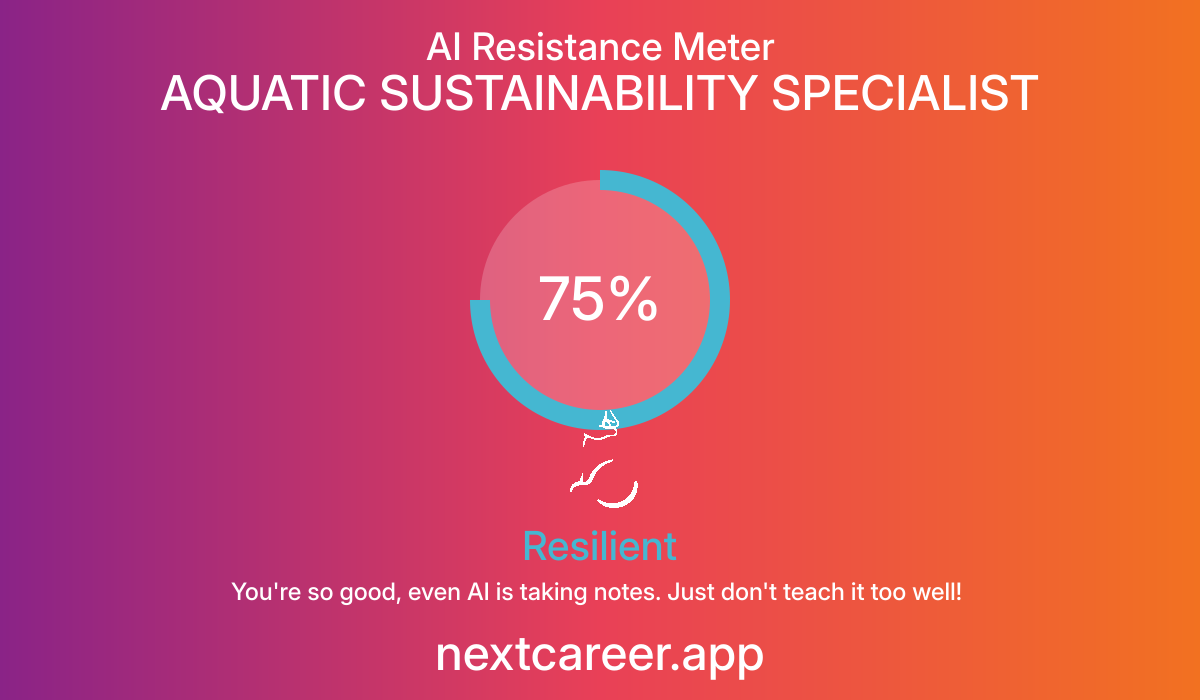AI Resistance Analysis
AQUATIC SUSTAINABILITY SPECIALIST
AQUATIC SUSTAINABILITY SPECIALIST
AI Resistance Score
AI Resistance Meter
Resilient
AQUATIC SUSTAINABILITY SPECIALIST
You're so good, even AI is taking notes. Just don't teach it too well!
Aquatic Sustainability Specialists focus on maintaining and restoring aquatic ecosystems, which involves a blend of ecological knowledge, data analysis, stakeholder engagement, and policy advocacy. While AI can aid in data analysis and modeling for sustainability, the multifaceted nature of ecology requires human expertise and emotional intelligence, especially in community engagement and environmental advocacy. Thus, while some tasks could be automated, the role requires a depth of understanding and adaptability that makes it resilient to full replacement by AI.
Aquatic Sustainability Specialists focus on maintaining and restoring aquatic ecosystems, which involves a blend of ecological knowledge, data analysis, stakeholder engagement, and policy advocacy. While AI can aid in data analysis and modeling for sustainability, the multifaceted nature of ecology requires human expertise and emotional intelligence, especially in community engagement and environmental advocacy. Thus, while some tasks could be automated, the role requires a depth of understanding and adaptability that makes it resilient to full replacement by AI.
Key Factors
- Cognitive tasks: While data analysis and modeling tasks can be automated, much of the role involves complex decision-making and strategic planning that AI cannot fully replicate.
- Emotional intelligence: The need for community engagement, stakeholder interaction, and collaboration emphasizes the importance of human empathy and understanding.
- Physical skills: Fieldwork and practical skills are needed, but they could be partially aided by robotics and drones in data collection.
- Creative thinking: Innovative solutions for sustainability challenges require human creativity and a comprehensive understanding of ecological systems.
Human Advantages
- Ability to engage in complex discussions regarding policy and ecological implications that require human emotion and context.
- Deep ecological understanding cannot be easily replicated; humans can synthesize information from various sources better than AI.
- Skills in negotiation and passion for environmental sustainability which are key for advocacy.
AI Vulnerabilities
- Data modeling and analysis could be entirely automated by AI systems.
- AI could facilitate monitoring and assessment of aquatic environments via sensors and satellite imagery.
Recommended Actions
- Invest time in developing emotional intelligence and stakeholder engagement skills to enhance interpersonal relationships in the community.
- Stay updated on AI technologies relevant to ecological data analysis to utilize them effectively and improve job efficiency.
- Consider interdisciplinary training to include policy-making, law, and cultural aspects of sustainability that AI cannot address.
In the near term (5 years), AI will increasingly assist Aquatic Sustainability Specialists by providing advanced analytics tools and predictive models for assessments of aquatic health. In the long term (20+ years), as AI evolves, the role may shift towards more supervisory, strategic, and interpersonal tasks, focusing on areas where emotional intelligence, ethical implications, and complex decision-making are paramount. The integration of smart technologies and AI will likely redefine the tools used by specialists, but the human element will remain critical.

Why Calculate AI Resistance?
Understanding how AI-resistant your career is becoming increasingly important in today's rapidly evolving job market. Our analysis combines multiple factors including required human skills, technological adaptability, and future industry projections to give you a comprehensive view of your career's sustainability.